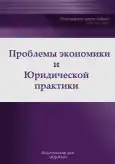Problematic Aspects of Juvenile Differentiation and Integration Responsibility in Public Law Branches
- 作者: Andryukhin N.G.1
-
隶属关系:
- Moscow State Institute of International Relations (University) of the Ministry of Foreign Affairs of the Russian Federation
- 期: 卷 18, 编号 2 (2022)
- 页面: 114-117
- 栏目: Articles
- URL: https://journals.eco-vector.com/2541-8025/article/view/531914
- ID: 531914
如何引用文章
详细
The article analyzes the current legislation, as well as theoretical and practical material accumulated by legal science and practice on the issues of minors legal responsibility in public law branches. On this basis, it is noted that in modern conditions, differentiated responsibility and punishment of juvenile offenders has particular importance in the fight against minors criminalization on the basis of taking into account the influence of their socio-psychological characteristics due to the age specifics on the degree of social danger of the individual and the acts committed by them. In modern conditions, many fundamentally new aspects of the differentiated minors’ responsibility have emerged, related to the implementation of a personal approach in public law branches from the standpoint of the legality and justice principles. In this regard, it is proposed to consider the prospects for the development of liability legislation not only by improving the institutions and norms of sectoral legislation, but also to see the integration potential at the suprasectoral level. Therefore, the issues of the quality of the current specialization state of public legal minors’ responsibility and its relationship with the sectoral differentiated juvenile responsibility in criminal and administrative legislation are investigated. The shortcomings of the intersectoral institutions and norms of juvenile legislation inconsistency are revealed, as well as proposals aimed at improving integration processes in the regulation of identity relations are made. Particular attention is paid to the gaps in the regulation of the minimum age of responsibility in public law sectors, the use of coercive measures of an educational nature, including the placement of a minor offender in a special closed educational institution. The article substantiates the proposal to expand the subject of legal regulation in criminal law and its sources in order to overcome defects in intersectoral public law regulation of juvenile liability.
全文:
作者简介
Nikolay Andryukhin
Moscow State Institute of International Relations (University) of the Ministry of Foreign Affairs of the Russian Federation
Email: n.andruhin@odin.mgimo.ru
Cand. Sci. (Law), Associate Professor, Deputy Dean of the International Law Faculty Odintsovo, Russian Federation
参考
- Alekseev S.S General theory of law: In 2 volumes, 1981. Vol. 1. 317 p.
- Alekseev S.S. The structure of Soviet law. M.: Legal literature, 1975. 264 p.
- Andriukhin N.G. Conceptual shortcomings in approaches to the regulation of administrative minors’ responsibility //Actual problems of administrative and administrative procedural law (Sorokin readings) : St. Petersburg: St. Petersburg University of the Ministry of Internal Affairs of Russia, 2022. 969 p.
- Parugaev Yu.I. Applied problems of the Russian Federation legislation on administrative offenses: abstract. diss. ...Dr. yurid. sciences, M., 2020. 43 p.
- Kobeleva M.M. Placement of a minor in a special educational closed type institution as a measure of a criminal-legal nature: diss. ... cand. jurid. M., 2015. 216 p.
- Smirnova L.E. Unification and differentiation in criminal law: correlation, similarity and difference // Actual issues of differentiation of responsibility and legislative technique in criminal law and process. Yaroslavl, 2004. 199 p.
- ECHR Ruling of 23.03.2016 «The case of Blokhin v. the Russian Federation» (complaint No. 47152/06) // Bulletin of the European Court of Human Rights. 2016. № 12.
补充文件










